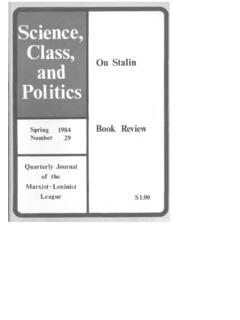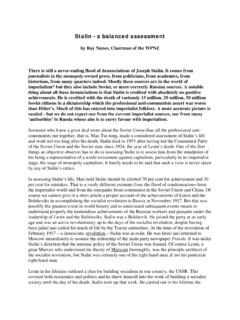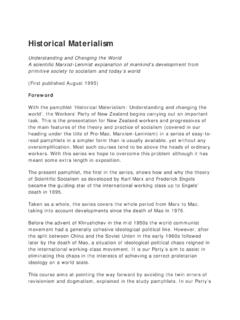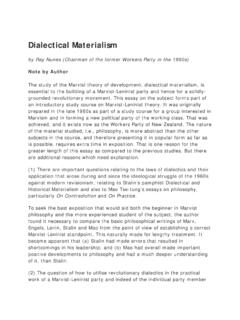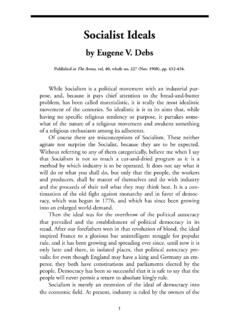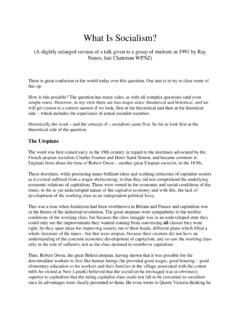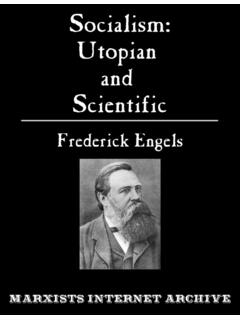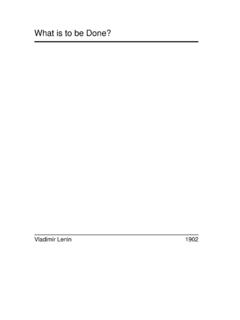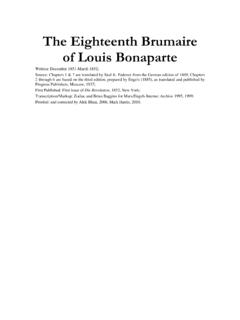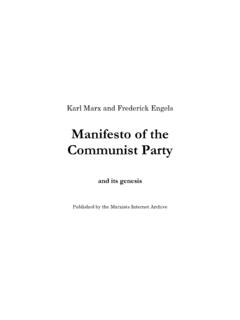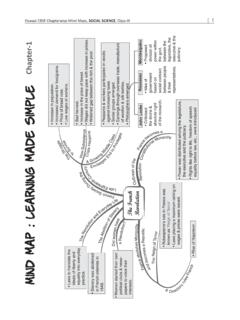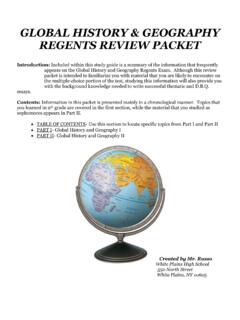Transcription of Economic & Philosophic Manuscripts of 18441
1 Karl Marx 1844. Economic & Philosophic Manuscripts of 18441 . Written: Between April and August 1844;. First Published: 1932;. Source: Marx. Economic and Philosophic Manuscripts of 1844;. First Published: Progress Publishers, Moscow 1959;. Translated: by Martin Milligan from the German text, revised by Dirk J. Struik, contained in Marx/Engels, Gesamtausgabe, Abt. 1, Bd. 3. Corrections were made of typographical errors and the author's obvious slips when preparing the Russian edition, 1956;. Transcribed: in 2000 for by Andy Blunden;. Proofed: and corrected by Matthew Carmody, 2009. Preface ||XXXIX| I have already announced in the Deutsch-Franz sische Jahrb cher the critique of jurisprudence and political science in the form of a critique of the Hegelian philosophy of law. While preparing it for publication, the intermingling of criticism directed only against speculation with criticism of the various subjects themselves proved utterly unsuitable, hampering the development of the argument and rendering comprehension difficult.
2 Moreover, the wealth and diversity of the subjects to be treated could have been compressed into one work only in a purely aphoristic style; whilst an aphoristic presentation of this kind, for its part, would have given the impression of arbitrary systematism. I shall therefore publish the critique of law, ethics, politics, etc., in a series of distinct, independent pamphlets, and afterwards try in a special work to present them again as a connected whole showing the interrelationship of the separate parts, and lastly attempt a critique of the speculative elaboration of that material. For this reason it will be found that the interconnection between political economy and the state, law, ethics, civil life, etc., is touched upon in the present work only to the extent to which political economy itself expressly touches upon these subjects. It is hardly necessary to assure the reader conversant with political economy that my results have been attained by means of a wholly empirical analysis based on a conscientious critical study of political economy.
3 (Whereas the uninformed reviewer who tries to hide his complete ignorance and intellectual poverty by hurling the utopian phrase at the positive critic's head, or again such phrases as quite pure, quite resolute, quite critical criticism, the not merely legal but social utterly social society , the compact, massy mass , the outspoken spokesmen of the massy mass 2. this reviewer has yet to furnish the first proof that besides his theological family affairs he has anything to contribute to a discussion of worldly matters.). It goes without saying that besides the French and English socialists I have also used German socialist works. The only original German works of substance in this science, however other than Weitling's writings are the essays by Hess published in Einundzwanzig Bogen3 and Umrisse zu einer Kritik der National konomie by Engels in the Deutsch-Franz sische Jahrb cher, where also the basic elements of this work [ Economic and Philosophic Manuscripts of 1844] have been indicated by me in a very general way.
4 (Besides being indebted to these authors who have given critical attention to political economy, positive criticism as a whole and therefore also German positive criticism of political economy owes its true foundation to the discoveries of Feuerbach, against whose Philosophie der Zukunft 2 Economic and Philosophic Manuscripts of 1844. Preface and Thesen zur Reform der Philosophie in the Anekdota, despite the tacit use that is made of them, the petty envy of some and the veritable wrath of others seem to have instigated a regular conspiracy of silence. It is only with Feuerbach that positive, humanistic and naturalistic criticism begins. The less noise they make, the more certain, profound, extensive, and enduring is the effect of Feuerbach's writings, the only writings since Hegel's Ph nomenologie and Logik to contain a real theoretical revolution. In contrast to the critical theologian of our day, I have deemed the concluding chapter of this work a critical discussion of Hegelian dialectic and philosophy as a whole to be absolutely necessary, ||XL| a task not yet performed.)
5 This lack of thoroughness is not accidental, since even the critical theologian remains a theologian. Hence, either he has to start from certain presuppositions of philosophy accepted as authoritative; or, if in the process of criticism and as a result of other people's discoveries doubts about these philosophical presuppositions have arisen in him, he abandons them in a cowardly and unwarrantable fashion, abstracts from them, thus showing his servile dependence on these presuppositions and his resentment at this servility merely in a negative, unconscious and sophistical manner. (He does this either by constantly repeating assurances concerning the purity of his own criticism, or by trying to make it seem as though all that was left for criticism to deal with now was some other limited form of criticism outside itself say eighteenth-century criticism and also the limitations of the masses, in order to divert the observer's attention as well as his own from the necessary task of settling accounts between criticism and its point of origin Hegelian dialectic and German philosophy as a whole that is, from this necessary raising of modern criticism above its own limitation and crudity.)
6 Eventually, however, whenever discoveries (such as Feuerbach's) are made regarding the nature of his own Philosophic presuppositions, the critical theologian partly makes it appear as if he were the one who had accomplished this, producing that appearance by taking the results of these discoveries and, without being able to develop them, hurling them in the form of catch-phrases at writers still caught in the confines of philosophy. He partly even manages to acquire a sense of his own superiority to such discoveries by asserting in a mysterious way and in a veiled, malicious and skeptical fashion elements of the Hegelian dialectic which he still finds lacking in the criticism of that dialectic (which have not yet been critically served up to him for his use) against such criticism not having tried to bring such elements into their proper relation or having been capable of doing so, asserting, say, the category of mediating proof against the category of positive, self-originating truth, [.]
7 ] in a way peculiar to Hegelian dialectic. For to the theological critic it seems quite natural that everything has to be done by philosophy, so that he can chatter away about purity, resoluteness, and quite critical criticism; and he fancies himself the true conqueror of philosophy whenever he happens to feel some element4 in Hegel to be lacking in Feuerbach for however much he practices the spiritual idolatry of self-consciousness and mind the theological critic does not get beyond feeling to consciousness.). On close inspection theological criticism genuinely progressive though it was at the inception of the movement is seen in the final analysis to be nothing but the culmination and consequence of the old philosophical, and especially the Hegelian, transcendentalism, twisted into a theological caricature. This interesting example of historical justice, which now assigns to theology, ever philosophy's spot of infection, the further role of portraying in itself the negative dissolution of philosophy, , the process of its decay this historical nemesis I shall demonstrate on another (How far, on the other hand, Feuerbach's discoveries about the nature of philosophy still, for their proof at least, called for a critical discussion of philosophical dialectic will be seen from my exposition itself.
8 |XL||. First Manuscript Wages of Labor Wages are determined through the antagonistic struggle between capitalist and worker. Victory goes necessarily to the capitalist. The capitalist can live longer without the worker than can the worker without the capitalist. Combination among the capitalists is customary and effective;. workers' combination is prohibited and painful in its consequences for them. Besides, the landowner and the capitalist can make use of industrial advantages to augment their revenues; the worker has neither rent nor interest on capital to supplement his industrial income. Hence the intensity of the competition among the workers. Thus only for the workers is the separation of capital, landed property, and labour an inevitable, essential and detrimental separation. Capital and landed property need not remain fixed in this abstraction, as must the labor of the workers. The separation of capital, rent, and labor is thus fatal for the worker.
9 The lowest and the only necessary wage rate is that providing for the subsistence of the worker for the duration of his work and as much more as is necessary for him to support a family and for the race of laborers not to die out. The ordinary wage, according to Smith, is the lowest compatible with common humanity6, that is, with cattle-like existence. The demand for men necessarily governs the production of men, as of every other commodity. Should supply greatly exceed demand, a section of the workers sinks into beggary or starvation. The worker's existence is thus brought under the same condition as the existence of every other commodity. The worker has become a commodity, and it is a bit of luck for him if he can find a buyer. And the demand on which the life of the worker depends, depends on the whim of the rich and the capitalists. Should supply exceed demand, then one of the constituent parts of the price . profit, rent or wages is paid below its rate, [a part of these] factors is therefore withdrawn from this application, and thus the market price gravitates [towards the] natural price as the center- point.
10 But (1) where there is considerable division of labor it is most difficult for the worker to direct his labor into other channels; (2) because of his subordinate relation to the capitalist, he is the first to suffer. Thus in the gravitation of market price to natural price it is the worker who loses most of all and necessarily. And it is just the capacity of the capitalist to direct his capital into another channel which either renders the worker, who is restricted to some particular branch of labor, destitute, or forces him to submit to every demand of this capitalist. The accidental and sudden fluctuations in market price hit rent less than they do that part of the price which is resolved into profit and wages; but they hit profit less than they do wages. In most cases, for every wage that rises, one remains stationary and one falls. The worker need not necessarily gain when the capitalist does, but he necessarily loses when the latter loses.
